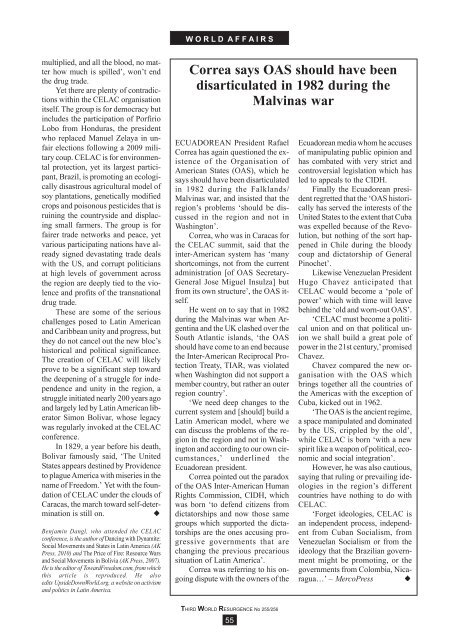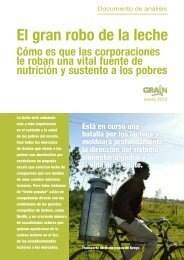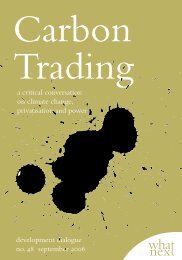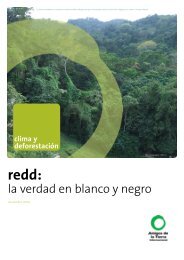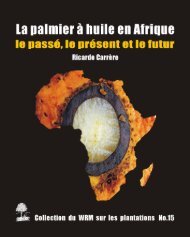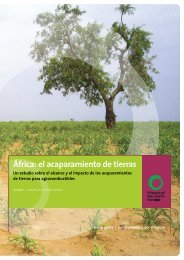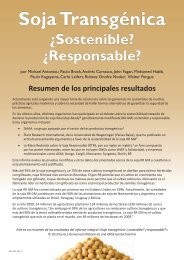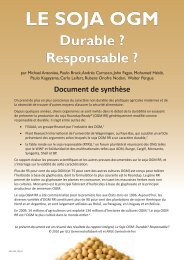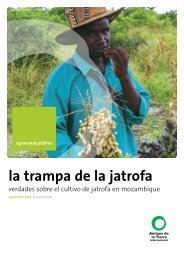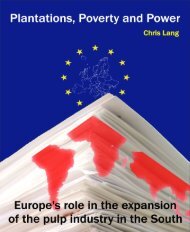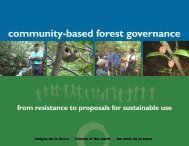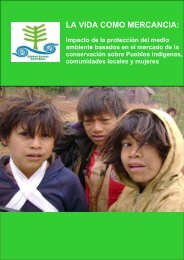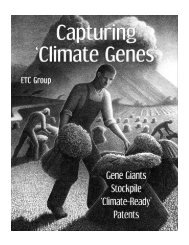Download - Third World Network
Download - Third World Network
Download - Third World Network
You also want an ePaper? Increase the reach of your titles
YUMPU automatically turns print PDFs into web optimized ePapers that Google loves.
W O R L D A F F A I R Smultiplied, and all the blood, no matterhow much is spilled’, won’t endthe drug trade.Yet there are plenty of contradictionswithin the CELAC organisationitself. The group is for democracy butincludes the participation of PorfirioLobo from Honduras, the presidentwho replaced Manuel Zelaya in unfairelections following a 2009 militarycoup. CELAC is for environmentalprotection, yet its largest participant,Brazil, is promoting an ecologicallydisastrous agricultural model ofsoy plantations, genetically modifiedcrops and poisonous pesticides that isruining the countryside and displacingsmall farmers. The group is forfairer trade networks and peace, yetvarious participating nations have alreadysigned devastating trade dealswith the US, and corrupt politiciansat high levels of government acrossthe region are deeply tied to the violenceand profits of the transnationaldrug trade.These are some of the seriouschallenges posed to Latin Americanand Caribbean unity and progress, butthey do not cancel out the new bloc’shistorical and political significance.The creation of CELAC will likelyprove to be a significant step towardthe deepening of a struggle for independenceand unity in the region, astruggle initiated nearly 200 years agoand largely led by Latin American liberatorSimon Bolivar, whose legacywas regularly invoked at the CELACconference.In 1829, a year before his death,Bolivar famously said, ‘The UnitedStates appears destined by Providenceto plague America with miseries in thename of Freedom.’ Yet with the foundationof CELAC under the clouds ofCaracas, the march toward self-determinationis still on.ÿuBenjamin Dangl, who attended the CELACconference, is the author of Dancing with Dynamite:Social Movements and States in Latin America (AKPress, 2010) and The Price of Fire: Resource Warsand Social Movements in Bolivia (AK Press, 2007).He is the editor of TowardFreedom.com, from whichthis article is reproduced. He alsoedits UpsideDown<strong>World</strong>.org, a website on activismand politics in Latin America.Correa says OAS should have beendisarticulated in 1982 during theMalvinas warECUADOREAN President RafaelCorrea has again questioned the existenceof the Organisation ofAmerican States (OAS), which hesays should have been disarticulatedin 1982 during the Falklands/Malvinas war, and insisted that theregion’s problems ‘should be discussedin the region and not inWashington’.Correa, who was in Caracas forthe CELAC summit, said that theinter-American system has ‘manyshortcomings, not from the currentadministration [of OAS Secretary-General Jose Miguel Insulza] butfrom its own structure’, the OAS itself.He went on to say that in 1982during the Malvinas war when Argentinaand the UK clashed over theSouth Atlantic islands, ‘the OASshould have come to an end becausethe Inter-American Reciprocal ProtectionTreaty, TIAR, was violatedwhen Washington did not support amember country, but rather an outerregion country’.‘We need deep changes to thecurrent system and [should] build aLatin American model, where wecan discuss the problems of the regionin the region and not in Washingtonand according to our own circumstances,’underlined theEcuadorean president.Correa pointed out the paradoxof the OAS Inter-American HumanRights Commission, CIDH, whichwas born ‘to defend citizens fromdictatorships and now those samegroups which supported the dictatorshipsare the ones accusing progressivegovernments that arechanging the previous precarioussituation of Latin America’.Correa was referring to his ongoingdispute with the owners of theEcuadorean media whom he accusesof manipulating public opinion andhas combated with very strict andcontroversial legislation which hasled to appeals to the CIDH.Finally the Ecuadorean presidentregretted that the ‘OAS historicallyhas served the interests of theUnited States to the extent that Cubawas expelled because of the Revolution,but nothing of the sort happenedin Chile during the bloodycoup and dictatorship of GeneralPinochet’.Likewise Venezuelan PresidentHugo Chavez anticipated thatCELAC would become a ‘pole ofpower’ which with time will leavebehind the ‘old and worn-out OAS’.‘CELAC must become a politicalunion and on that political unionwe shall build a great pole ofpower in the 21st century,’ promisedChavez.Chavez compared the new organisationwith the OAS whichbrings together all the countries ofthe Americas with the exception ofCuba, kicked out in 1962.‘The OAS is the ancient regime,a space manipulated and dominatedby the US, crippled by the old’,while CELAC is born ‘with a newspirit like a weapon of political, economicand social integration’.However, he was also cautious,saying that ruling or prevailing ideologiesin the region’s differentcountries have nothing to do withCELAC.‘Forget ideologies, CELAC isan independent process, independentfrom Cuban Socialism, fromVenezuelan Socialism or from theideology that the Brazilian governmentmight be promoting, or thegovernments from Colombia, Nicaragua…’– MercoPress uTHIRD WORLD RESURGENCE No 255/25655


